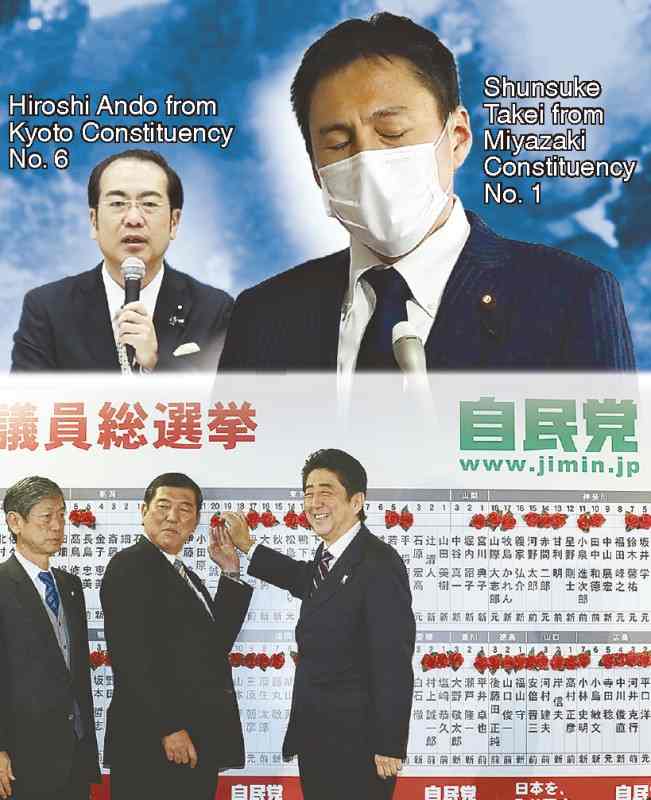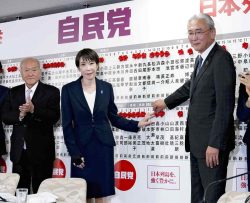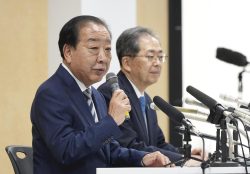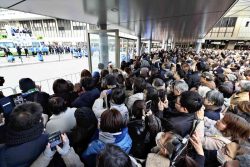
An artist illustration : Shunsuke Takei from Miyazaki Constituency No. 1, Hiroshi Ando from Kyoto Constituency No. 6
14:00 JST, August 17, 2021
Japan’s political parties are making preparations for the House of Representatives election that must be held by autumn. The ruling coalition of the Liberal Democratic Party and Komeito face several internal issues, while the opposition parties search for ways to win more lower house seats. Amid all this, the LDP must also deal with an intraparty presidential vote involving Prime Minister Yoshihide Suga.
This series, Backstories to General Election, is appearing exclusively online on The Japan News. Information is accurate as of the time the series was originally printed in Japanese in The Yomiuri Shimbun in July.
***
The LDP Diet members who first won their seats in the 2012 lower house election have so far only run for office amid highly favorable conditions. This time, however, they’re facing a challenge.
“The situation has become this serious because you’ve neglected to build a relationship of trust with the [LDP’s] prefectural chapter. Look again at the situation you’re in now.”
These harsh words were directed at Shunsuke Takei on June 30, at the Election Strategy Committee chairperson’s office on the fourth floor of the LDP headquarters in Tokyo. Takei hung his head in shame as chairperson Taimei Yamaguchi criticized him this way.
Takei has been elected to the lower house three times since the 2012 election from Miyazaki Constituency No. 1, and belongs to the Kishida faction led by Fumio Kishida in the party.
Three days earlier, the LDP’s Miyazaki prefectural chapter decided not to ask LDP headquarters for Takei to be the official party candidate in the next lower house election. On June 8, his state-paid secretary, who was driving a car owned by Takei, had tried to leave the scene after being involved in a collision in the Roppongi area of Tokyo.
Takei was also in the car when the accident took place, and the safety inspection for the vehicle was found to have expired.
After his meeting with Yamaguchi, Takei murmured, “I may have been somewhat complacent.”
Some prefectural assembly members had complained to Takei, whose relationship with them was tenuous. One said: “You’ve seldom appeared in your constituency. What on earth are you doing?”
The prefectural chapter asked LDP headquarters to accept applications from the general public to be the party’s official candidate to replace Takei in the constituency. However, the party headquarters rejected the request, on the grounds that priority should be given to incumbent Diet members.
Toru Hoshihara, who heads the prefectural chapter and is a prefectural assembly member, complained openly, saying: “If incumbent Diet members are endorsed as official party candidates on a priority basis, then the responsibility lies with the party headquarters. We in the prefectural chapter have no choice but to make judgments on our own.”
Those who were elected for the first time in the 2012 lower house election, including Takei, have been dubbed “problematic three-time winners” for their involvement in many scandals.
In the 2012 lower house election, the LDP gained momentum and took back the reins of government from the then Democratic Party of Japan. As many as 119 new LDP Diet members were born. The LDP won the 2014 and 2017 lower house elections as well under the administration of former Prime Minister Shinzo Abe. As a result, the three-time winners have experienced nothing but “easy elections.”
There are still 79 such third-time winners who won their seats for the first time in 2012. But criticism of the administration of Prime Minister Yoshihide Suga has been mounting over its handling of the novel coronavirus pandemic, raising the possibility that for the first time they will take on a lower house election with the wind blowing against them.
Desperate support from factions
The percentage of Diet members who have been elected to the lower house three or fewer times are as follows: 55% of the Hosoda faction led by Hiroyuki Hosoda; 41% of the Aso faction led by Taro Aso; 43% of the Takeshita faction led by Wataru Takeshita; 45% of the Nikai faction led by Toshihiro Nikai; and 52% of the Kishida faction led by Fumio Kishida.
As the performance of young members is directly linked to the rise or fall of each faction, all these groups are trying hard to shore up support for them.
On July 11, a gathering was held in Tomakomai, Hokkaido, to rally support for Manabu Horii of the Hosoda faction. Raising his fists in the air, former Prime Minister Abe asked the participants to back Horii. “[Mr. Horii,] together with me, retook the reins of government and he has been elected three times in succession. However, a severe headwind is blowing toward the LDP in the next election,” Abe said.
The previous day, Abe went to Niigata Prefecture to attend a briefing session on the political activities of Kenichi Hosoda of the faction, who has been elected three times to the lower house. When Hosoda visited Abe beforehand to ask him to coordinate his schedule for the briefing session, Abe quickly replied, “I’ll go to the briefing session on the most convenient day for you, Mr. Hosoda.”
After the next lower house election, Abe is expected to return to the Hosoda faction, to which he had belonged since becoming a Diet member. Abe appears to have attended meetings to support members of the Hosoda faction because he wanted to keep it from shrinking in size as much as possible, eyeing a change in the faction leadership to himself.
On July 5 and 7, the Takeshita faction called into its office lawmakers whose projections were poor for the next lower house election in a recent survey conducted by the LDP.
Senior members of the faction, including acting chairman Toshimitsu Motegi, gave these lawmakers detailed instructions on their activities for the next lower house election, based on the numbers of votes they had won in past contests.
For example, Atsushi Nonaka, who has been elected three times from Saitama Constituency No. 12, was told: “Don’t rely on a private business. Put your election flyers in people’s mailboxes by yourself.”
After the interviews with senior members of the faction, the lawmakers left the office with grim expressions.
Similar efforts have been made by other factions, but some lawmakers have complained that senior members of their factions have nothing to say but obvious advice like “walk around your local constituencies.”
There are some lawmakers who are ready to give up. Hiroshi Ando, who has been elected three times to the lower house from Kyoto Constituency No. 6 and belongs to the Aso faction, came under the spotlight for his proposals calling for bold spending of public funds focusing on modern monetary theory (MMT), which allows the expansion of fiscal deficits.
However, in June, when a senior official of the Kyoto prefectural chapter pressed him to deal with a scandal involving an affair with a woman, he clearly answered, “I won’t run in the next election.”
Shoji Nishida, who had worked hard to resolve the scandal as the head of the Kyoto prefectural chapter, said with an amazed expression: “We pined our hopes on him, but I think he’s already lost interest in being a Diet member.”
However, there are LDP lawmakers who have been elected three times to the lower house — including Murai Hideki from Saitama Constituency No. 1 who belongs to the Kishida faction, and Takayuki Kobayashi from Chiba Constituency No. 2 who belongs to the Nikai faction — who have demonstrated their policymaking abilities and are seen as good prospects.
If they win in the next election and are elected four times, they may be able to secure posts as vice ministers and Cabinet ministers.
“Don’t stand in a place like this. Work hard as a Diet member.” When Murai stands in front of stations to make street speeches, passers-by sometimes say things like this to him. The more he devotes himself to policymaking, the less time he can spend walking around his local constituency. Young lawmakers like him, who still have a weak electoral base, are always faced with a dilemma.
Many veterans in the LDP, including Bunmei Ibuki and Yasuhisa Shiozaki, will retire at the end of this term. How many three-time winners will be able to overcome the rough seas? This will affect the fate of not only these factions, but also of the party itself.
Top Articles in Politics
-

Japan PM Takaichi’s Cabinet Resigns en Masse
-

Sanae Takaichi Elected 105th Prime Minister of Japan; Keeps All Cabinet Appointees from Previous Term
-

Japan’s Govt to Submit Road Map for Growth Strategy in March, PM Takaichi to Announce in Upcoming Policy Speech
-

LDP Wins Historic Landslide Victory
-

LDP Wins Landslide Victory, Secures Single-party Majority; Ruling Coalition with JIP Poised to Secure Over 300 seats (UPDATE 1)
JN ACCESS RANKING
-

Japan PM Takaichi’s Cabinet Resigns en Masse
-

Japan Institute to Use Domestic Commercial Optical Lattice Clock to Set Japan Standard Time
-

Israeli Ambassador to Japan Speaks about Japan’s Role in the Reconstruction of Gaza
-

Man Infected with Measles Reportedly Dined at Restaurant in Tokyo Station
-

Man Infected with Measles May Have Come in Contact with Many People in Tokyo, Went to Store, Restaurant Around When Symptoms Emerged




















